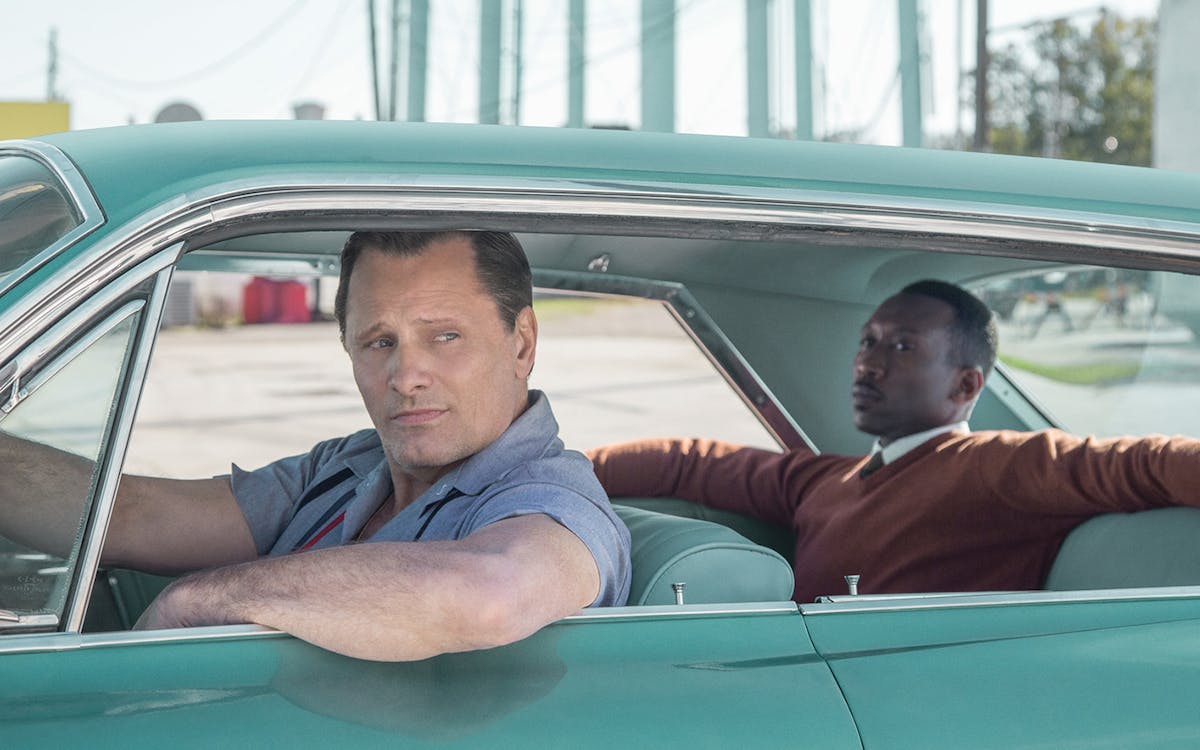Green Book bills itself as a comedy-drama “based on a real life friendship” between a gifted and refined concert pianist, Donald Shirley (played by Mahershala Ali), and Frank Anthony “Tony Lip” Vallelonga (played by Viggo Mortensen), a nightclub bouncer whom Shirley hires as his driver for a tour through the American South. The movie is directed by Peter Farrelly of Dumb and Dumber and Shallow Hal, and if it were a simple buddy comedy about the hijinks that are bound to happen when you put a pianist and a bouncer on a road trip together, it might have worked. But these aren’t just regular guys on a road trip.
Instead, an Italian-American (Tony) and a Jamaican-American (Don) embark on a concert tour through the South in 1962, just a few years after Nat King Cole was assaulted by white men during a concert in Birmingham, Alabama in 1956. The racism of that era is a prominent fixture in the film—the reason Tony is hired as Don’s driver is because he needs a white man to intercede for and protect him in the South—and the attempts to draw humor from such a story are often uneven and tone deaf. The film ends up playing racism for laughs.
The movie takes its name from the actual Green Book, a book created by and for black people as a guide to black-friendly restaurants and hotels, designed to make navigating the U.S. during the Jim Crow era as safe as possible. The book could very often be the difference between life and death for black travelers, particularly if they found themselves in a sundown town, as Tony and Don do in the movie. But for the entirety of the film, the Green Book is only ever shown in the hands of white men. It’s Tony who offhandedly explains the book to his relatives at the beginning of the trip and Tony who begrudgingly refers to it when Don reminds him that he needs to stay in a welcoming place. As the driver, Tony is responsible for navigating and making arrangements for Don, but this dynamic insures that in a movie about racism, with two supposed leads, the true protagonist is the white man. (After all, the screenplay was co-written by Nick Vallelonga, son of the real-life Tony.)
There are many layers to Don, a black man who values various signifiers of wealth and dignity as a form of protection (when he and Tony first meet, Don is sitting on a throne). That protection repeatedly, tragically fails him throughout the movie. His character tries to address racism through respectability politics, and ends up isolating himself from black people who don’t understand him and white people who don’t want to understand him. Ali beautifully captures the depth hinted at in Don; one can only imagine the film if the actor had been given more to work with. Instead, the movie is a redemption tour for Tony, who learns that it’s wasn’t good for him to be racist. Don’s lesson is harsher, as he grapples with the reality that nothing he does will protect him from racism, but the movie doesn’t spend enough time focused on him for the message to sink in. Instead, some of Don’s moments of harsh realization are played off as jokes.
The film sees the story from Tony’s perspective, and when it played at the Austin Film Festival, the audience disconcertingly followed his laugh cues. The attempts at comedy are largely uncomfortable, because what was often funny for Tony—and for an unsurprisingly large number of the AFF attendees—were moments of casual racism. Tony largely laughs when Don, an uppity black man, finds himself succumbing to the stereotypes he’s tried to avoid. He laughs when a concert host decides to serve Don fried chicken, but not when that same host refuses to let Don use the indoor bathroom. Tony misses how those two incidents come from the same place of ignorance and racism, and judging by the laughter at the screening, much of the audience did, too.
In Green Book, the audience follows the transformation of a protagonist who becomes less racist: Tony changes from a man who put two glasses in the trash after black repairman drank water from them into a man who firmly tells a relative not to call Don by a derogatory term. Yet he’s the same man who, during an argument, calls Don prejudiced for comparing him to other white people and tells Don that he’s “blacker” than him because Tony is the one who introduced Don to fried chicken and the music of Aretha Franklin. The uneven approach of this movie proves that it’s difficult to make racism seem funny. But the audience should be asking a different question: Why would you want to?
- More About:
- Film & TV














You must be logged in to post a comment Login